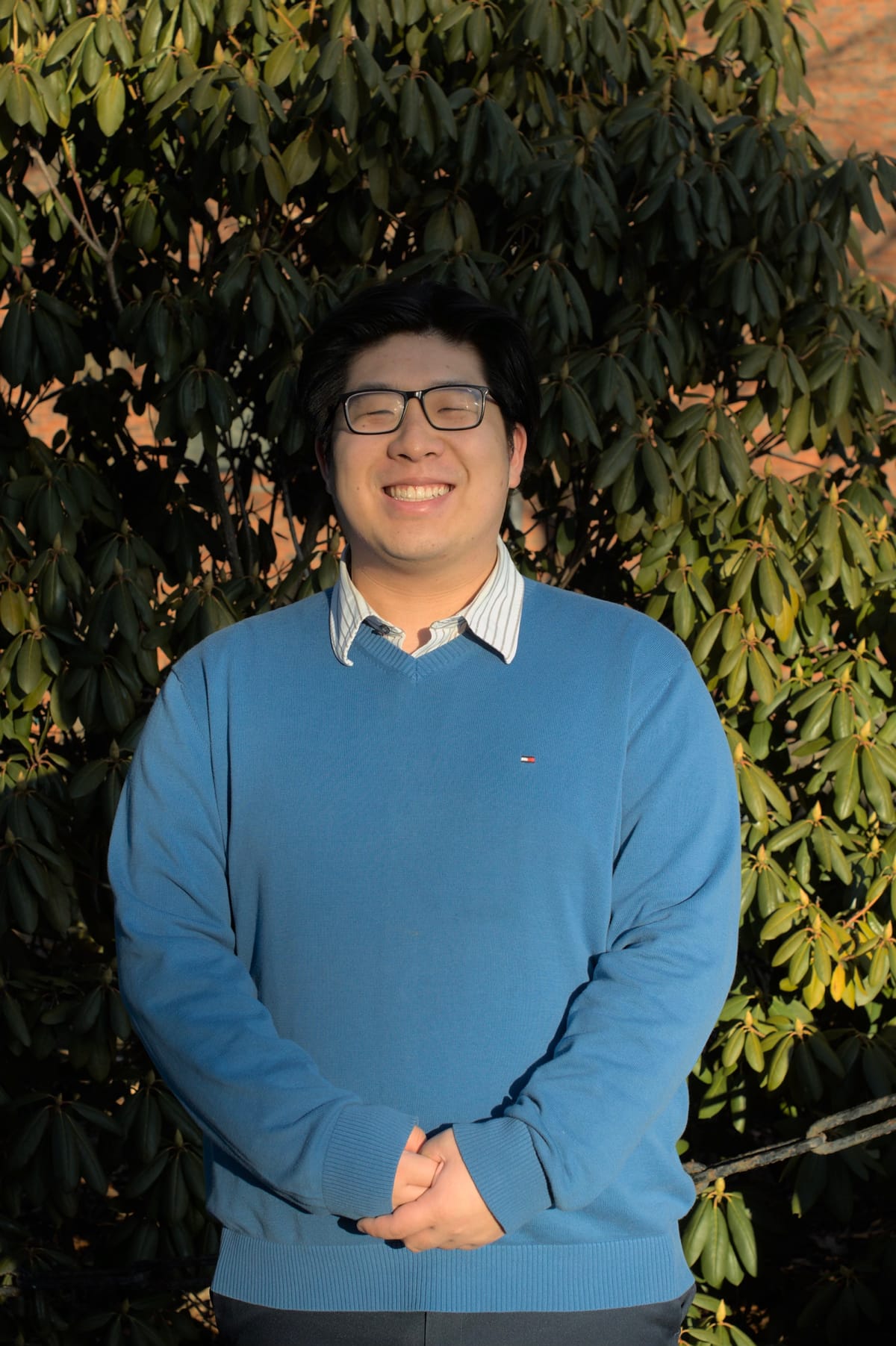Context, Creation, Come-Up: Taz Kim ’23
For this edition of 3C’s, Columnist Kobe Thompson ’24 sits down with cellist Taz Kim ’23 to discuss his background in classical music and how the instrument has served as a springboard into other genres.

“I was good at something,” admitted Taz Kim ’23. “And being good at something is worth so much as a young kid.” In this edition of 3C’s, I spoke with Kim about the “Context” of his relationship with classical music, the “Creation” of his upcoming thesis performance, and what’s on the “Come Up” as Kim prepares for graduate school with some heartfelt goodbyes.
“It’s funny, I was always really in love with the saxophone.” These are not the first words I expected to hear from a talented cellist like Kim. Kim’s relationship with the instrument began in the basement of St. Gabriel’s Church in New Rochelle, New York, where he attended an after-school music program. The program was a volunteer-run effort to introduce young children from underprivileged backgrounds to playing music. At his very first lesson, Kim was in for a surprise: “I’m expecting there to be a saxophone, and there’s a cello. What’s going on here?” This sax switcheroo was orchestrated by none other than Kim’s own mother.
Time and patience made Kim understand the matter on a deeper level. “It’s funny. it’s like the Asian thing of ‘play an instrument,’” he said. “Playing an instrument well, for [his parents], was a means to an end.” For Kim’s mother, these ends were building social skills, growing a resume, and learning to believe in himself. Neither Kim nor his mother predicted that his playing music would transcend its “means-to-an-end” status and become “the end” in and of itself over the next fifteen years.
“It ended up working out for the best. I absolutely fell in love with the sound,” Kim said. He described how his love for the cello crept throughout his entire body, much like the resonant vibrations of the instrument itself. Kim added that the projection of sound deep within your body could create an intimate physical connection between the player and the cello. “You feel it to your core, you sit down and you place it against your chest and legs,” he told me. “There’s a good deal of vibration that goes through your body. The feeling of it is indescribable. It’s incredibly warm, incredibly rich.”
An after-school program could only take Kim so far. Because the volunteers were teenagers, Kim’s first teachers eventually graduated and moved away to college. This marked a transition for Kim — after his student-teachers left, he was passed on to their instructor, David Krieger.
Kim’s relationship with Krieger exemplifies the strong interpersonal connections he built through playing the cello. Krieger taught Kim the intricacies of the instrument from elementary school until his high school graduation. Kim described Krieger as “one of the biggest impacts on [his] life,” “insane,” and, “simply amazing.”
Kim’s natural aptitude as a cellist motivated him to continue his hard work. “The whole practicing thing was kind of a buzzkill. No kid in their right mind in the third or fourth grade wants to spend time practicing for an hour when they could be doing anything else,” Kim said. “[But] until I found a real love and passion for it later down the line. What really kept me going was the fact that I got great feedback from people.” He could lay claim to a level of skill few around him possessed. “That gave me a lot of confidence during a time where a lot of kids struggle finding it,” he said. “I was good at something, and being good at something is worth so much as a young kid.”
Kim was also profoundly impacted by his own experience as a teacher. “Once I got into late middle school, eighth grade, I started to volunteer [at the program] to start teaching other kids,” Kim told me. “I did that from eighth grade until the end of high school as well.” Although Kim’s students were only a few years younger than him, he was invested in sharing his knowledge of the cello with them. “[Teaching] was a really great outlet for me,” Kim said.
Sharing his knowledge with his students and inspiring in them the same passion for music that he felt was a formative experience for Kim. He understood from personal experience that learning to play classical music was a rare opportunity outside of affluent households. Providing this opportunity to underprivileged children allowed him to take on the role of a mentor for his students, , just as his past cello instructors had mentored him.Kim has a striking love for classical music, as his instrument may suggest, but the cello is more complex an instrument than to be boxed into a single genre. “If you look up ‘cello’ on YouTube, you would get so many different kinds of performances. You get the very traditional classical performances, but you get people playing electric cellos, or rock music, or pop arrangements.” While Kim’s mother wasn’t enthusiastic about this deviation from classical cello music, this variety motivated him to continue to push himself as a cellist. Kim saw firsthand that the cello was a launchpad into a world of feeling and expression. The cello was a way for him to take chances and make choices, especially during a time when he lacked autonomy.
In elementary school, the music Kim listened to was regulated by his parents: “It was whatever was on the radio that wasn’t explicit.” In middle and high school, however, Kim became captivated by hip hop and rock music, which, at least for the time being, was a heavy deviation from the cello suites and concerto pieces he was accustomed to.
As he explored these genres on the cello, he used his more traditional pieces to work on sight reading and explored playing by ear with the Beatles’ cello arrangements. He emphasized that this alternative approach to the cello that wasn’t completely entrenched in the customs of classical music is what kept him challenged and interested in playing.
Recently, Kim was given the opportunity to help work on the soundtrack for an art exhibit in Fayerweather Hall by Ohan Breiding, the college’s current artist-in-residence. “I could draw that back to being young and listening to all these different people playing on YouTube.” The cello is an instrument that plants the musician in place, yet Kim has been able to explore the field of sound and find beauty in every note, inspiration in every measure.
There is a common expectation for classical music that places it in a rigid box, but Kim defies that expectation. Classical music is seen as an exact art, without mistake and steeped in tradition that can confuse those outside of the loop. But Kim compares the work of a classical musician to that of an artist performing Shakespeare. Perhaps every word of the script is known, and every story beat and plot twist has become obvious, but the beauty of the performance arises in the interpretation of the same story. Classical music’s capacity for personal interpretation has helped Kim discover his most sincere and vulnerable self, allowing his body to become a vessel of the music and his cello a conduit for the angst, excitement, and fervor of a composition. By stripping himself bare like this, Kim grew both as a cellist and person.
Now, Kim is faced with the largest culmination of effort and training of his entire cello career: his senior thesis, “Inspiration and Reinvention.” Kim likens the scale of the project to his early days listening to CDs from cello greats like Yo-Yo Ma, claiming, “It took me from fifth grade to a sophomore in college to be able to start [learning his music]. That shows you how much time it takes to master and get to the point to approach [a piece like that].”
But Kim doesn’t have a decade to master his thesis. Having started in December 2022, he had a little over four months to curate and practice the pieces he will eventually perform on April 22. “From February until now, I’ve been trying to play it as fluidly as possible.” With such a short time frame, “this is the fastest timeline I’ve ever been on,” his apprehension comes from a modesty of sorts, but behind his humility is a drive that motivates Kim towards what he calls “the end.” For him, this thesis is the last thing to work towards. “I’m doing this thesis as a goodbye to all the years I’ve done in cello. Full transparency: I’m going to law school. The plan is to be a lawyer. I won’t be able to play music as much. It’ll always be a part of me, but this is probably the highest level I’ll probably ever play at in my life.” For the past three years, Kim says he’s always practiced towards something, a concert or other performance. Now, Kim feels he will be liberated with no thesis, no concerts, or no symphonies. He can play whatever he wants. A revelation that brought me to near tears, Kim had the foresight to end things on his own terms.
As such, there may not be much on the horizon for Kim in a musical sense. A senior thesis on April 22 and a final performance in May called “Holst: The Planet.” But Kim’s departure from music is more of a paring down of his tenacious dedication to music rather than a true farewell. His role as a teacher and a curator of music will be everlasting.
Even in his selection of songs for the thesis, Kim speaks of being a “responsible citizen,” working to highlight real changes made in the culture of classical music both stylistically and in representation. Citing George Walker, Kim spoke on the importance of diversity in classical music and how this can further break down people’s ill-conceived notions of the genre’s Eurocentric roots. It is something more, “[classical music] is still alive, and it’s a lot bigger than anyone gives it credit for.”
The fruits of these efforts are felt at Amherst College — the Amherst Kim is leaving behind is remarkably different from the one he entered nearly four years ago. “I’m just very grateful to be in the moment that I am right now … Now that I’m leaving there’s certain things I wish happened earlier. But then again, no, it makes me more appreciative of the fact that kids are coming in now.” Kim helped shape the orchestra department, foster an inclusive and respectful environment, and brought his mentorship to a program that gave him as much as he gave it, and so much more. Kim admits that Amherst College isn’t a “music school” like one may imagine Berklee or Julliard, but “it’s a great place to come if you’re a musician.” We have people like Kim to thank for that.
And Kim has his own list of people to thank, from his incredible parents to his two cello teachers, Wayne Smith, now on Broadway, and Karl Knapp. Kim thanks his thesis advisor David Schnieder and conductor Mark Swanson. Kim is also grateful for the outpouring of love and support he’s received from his orchestra mates, naming Claire Taylor ’23, Cassandra Jin ’24, Oren Tirschwell ’25, and Harris Panner ’25. Last but not least, Kim is grateful for his wonderful girlfriend, Maya Foster ’23. To him, these are “those people on campus that have been integral to sustaining and revitalizing my love for music.” Inspiration and reinvention — it’s all Kim has ever known.




Comments ()